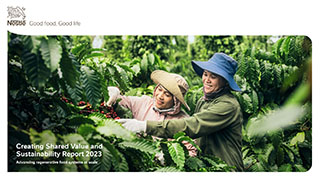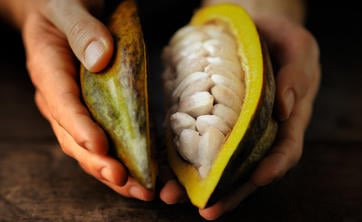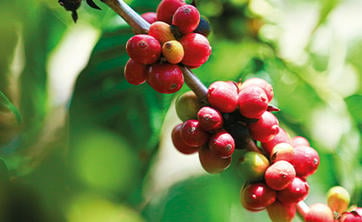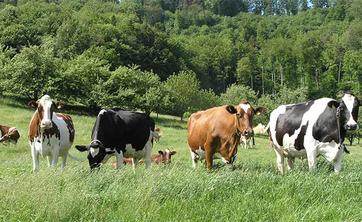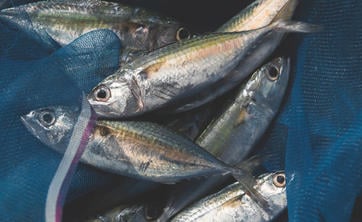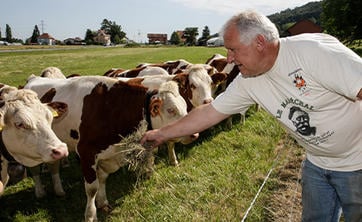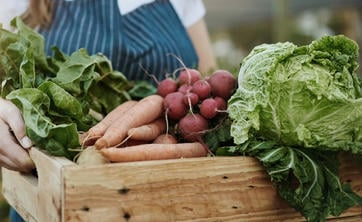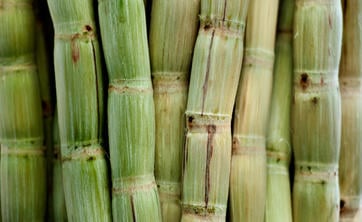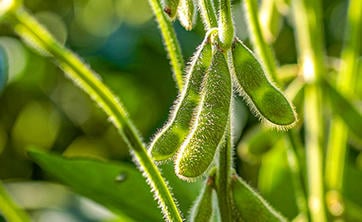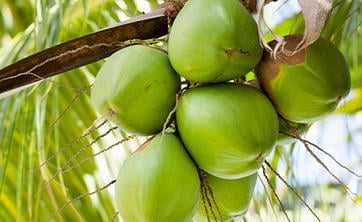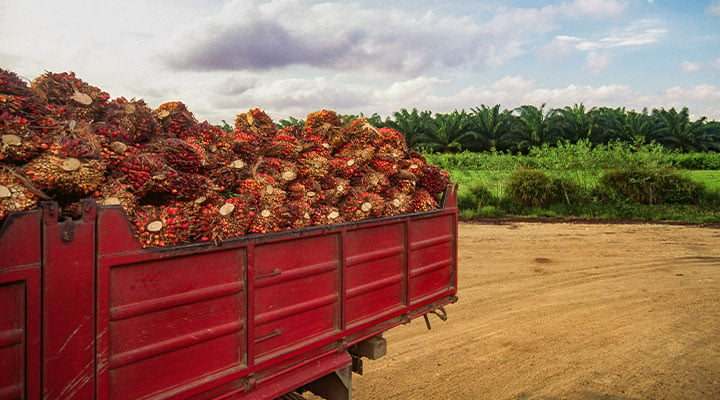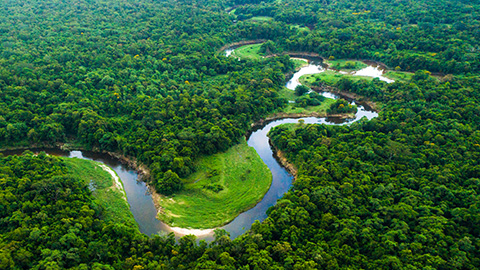Responsibly sourced palm oil

Palm oil is a cost-competitive, versatile and widely produced vegetable oil. When responsibly sourced, it can support millions of livelihoods and reduce pressure on forests and sensitive ecosystems.
Our progress toward responsibly sourced palm oil
We use palm oil as an ingredient in a number of Nestlé products. To address the challenges facing our palm oil supply chains, we start by understanding where the palm oil comes from and how it is produced. We buy from processing companies that source palm oil in Malaysia, Indonesia, Latin America and West Africa. And we work with expert organizations and the industry to continually improve environmental and social practices.
You can take the Beneath the Surface quiz to learn more about how we’re working with smallholder farmers to encourage and embed more responsible practices throughout our palm oil supply chain.
Our approach to responsibly sourced, deforestation-free palm oil
We work with our suppliers and partners to continuously improve the practices of our upstream supply chain for palm oil, including assessing and addressing deforestation risks.
For more than 10 years, we have been using a combination of tools, including supply chain mapping, certification, satellite monitoring and on-the-ground assessments, to assess and address deforestation risks in our supply chains and improve our understanding of human rights and land rights risks. The results help us identify landscape-level initiatives that can be duplicated for other raw materials.
During 2023, 100% of our crude palm oil volume was from Roundtable on Sustainable Palm Oil (RSPO) certified sources. Market shortages meant that we were only able to purchase 54% of our kernel oil volume from RSPO sources. To help prevent future supply issues, we decided to send a strong market signal. It takes an average of 10 tonnes of crude palm oil to produce a tonne of kernel oil. We purchased certificates for RSPO-certified crude palm oil equivalent to 20 times (1 339 751 tonnes) the missing volume of certified kernel oil (66 988). We also provided technical assistance to around 53 700 independent smallholders to help them become RSPO certified.
Working towards deforestation-free supply chains is the foundation of our Forest Positive strategy. The strategy also has a broader aim to make a positive impact throughout our sourcing landscapes. This will contribute to delivering our Net Zero Roadmap (pdf, 8Mb).
Our palm oil team has mapped sourcing regions with the greatest land rights risks against volumes of palm oil sourced from those regions. This is expected to improve our understanding of land rights risks. The results are being used to develop a strategy for identifying landscape-level projects that Nestlé can support and/or participate in and can be duplicated for other raw materials.
As part of our Human Rights Framework, we have launched action plans for the most salient issues in our supply chains. Within the palm oil supply chain, we focus on assessing, addressing and reporting on Indigenous peoples and local communities’ land rights, Forced labor and responsible recruitment, and Living income and Living wage.
Pioneering satellite monitoring technology
We partnered with Airbus and Earthworm Foundation to implement Starling, a satellite based service to monitor 100% of our global palm oil supply chains. Starling provides highly detailed optical and radar images of land across huge areas. We monitor over 9000 farm boundaries, as well as the area surrounding more than 1700 mills, to determine whether origins are verifiably deforestation-free and whether further supplier engagement and investigation are needed.
Using data gathered through Starling, we have created a palm oil transparency dashboard to update stakeholders on our progress in achieving deforestation-free palm oil, and to share our learnings.
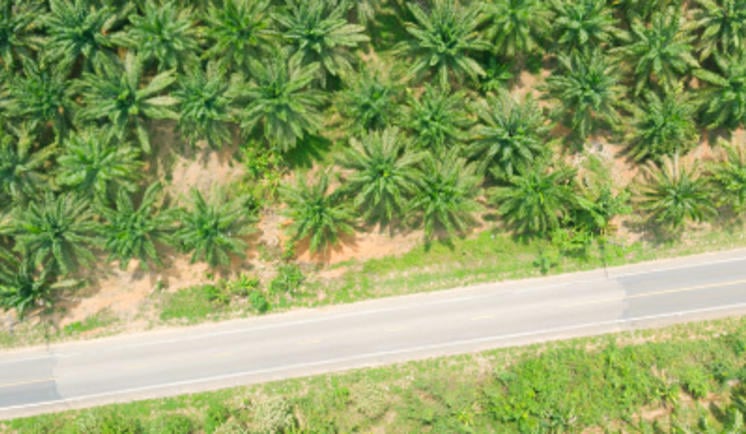
Using landscape approaches to address root causes
We aim to address sustainability challenges and opportunities at the landscape level and view the farms, communities, and processing facilities that are connected to our supply chain as an integrated part of that broader landscape. To that end, we are increasing our focus on ‘landscape initiatives’, meaning integrated, multi-stakeholder efforts that work across industries at a jurisdictional level to address the root causes of the issues we work to address.
In Malaysia we work alongside the Earthworm Foundation to support landscape initiatives such as in Sabah in northern Borneo, which supplied 6.2% of the world’s palm oil in 2020. Together, we hope to show smallholder farmers what’s possible when we combine regenerative agricultural practices like intercropping and forest conservation.
In Mexico, the Mexico Palm Oil Holistic Program is a collaborative effort between Nestlé, PepsiCo, Oleopalma, RSPO, Proforest, and Femexpalma to support the sustainable development of the Mexican palm oil sector. This program was launched in 2017, and Nestlé joined in 2018 with the objective of increasing smallholders’ resilience to market changes and developing new tools aiming to conserve forests while improving livelihoods. The program’s goals are to help drive responsible sourcing in the Mexican palm oil sector, for including smallholders and implement best practices to help prevent deforestation and human rights risks.
Supporting Conservation and Restoration
We support the conservation and restoration of forests and other important ecosystems. Since 2021, we have scaled up our investment for conservation and restoration around our palm oil supply chain. These initiatives embrace new models of conservation financing, collaboration, and action to drive positive impacts for people, climate and nature.
In Malaysia, Project RELeaf supports our Forest Positive strategy to combat the impact of climate change and lower carbon emissions. It does this by preserving Malaysia’s forests and rich biodiversity, while promoting sustainable livelihoods for communities and seeks to achieve 700 000 tonnes of carbon removals over 10 years.
After a delay caused by COVID, by 2025, Nestlé Malaysia aims to plant 3 million trees across the country to help restore riparian and forest ecosystems and protect wildlife as well as critical water supplies. Project REleaf was further enhanced in June 2023 with the announcement of a collaboration with TDM Plantation (TDMP) that is contributing more land for Nestlé Malaysia to continue planting trees.
We partner with Forest Carbon and our supplier Golden Agri-Resources for large-scale wetland forest conservation and restoration in the South Sumatra Merang biodiversity zone. The project covers more than 22 000 hectares of tropical wetland forest, home to Sumatran tigers and 20 other rare, threatened or endangered species. The project aims to prevent fires and remove carbon from the atmosphere through vegetation regrowth.
Continuing to improve sustainability practices
We work together with direct suppliers to continuously improve the practices of our upstream supply chain, all the way up to smallholder farmers. We also work with partners to conduct supplier assessments and identify gaps. This informs the development of action plans with defined milestones and deadlines to act upon risks and identified opportunities for improvement.
- Respect the Nestlé Responsible Sourcing Standard
- Comply with local laws and regulations
- Not use areas cleared of natural forest after December 31, 2015
- Respect local and indigenous communities’ rights to free, prior and informed consent
- Protect HCS land
- Protect peatlands
When a supplier fails to effectively manage identified risks or meet agreed deadlines, we take decisive action. To provide assurance of this, we have removed the following 20 upstream supply chain companies from the Nestlé supply chain since 2018.
- DTK Opportunity
- Korindo Group
- Indonusa
- PACIFIC INTER-LINK (HSA)
- PTT Green Plc
- Salim Group/Indofood
- Noble
- Posco Daewoo
- Cilandri Anky Abadi
- PT. Indo Sawit Perkasa
- PT. Kallista Alam
- PT. Laot Bangko
- PT. Surya Panen Subur
- Samling
- PT Agro Nusa Abadi (ANA)
- PT Lestari Tani Teladan (LTT)
- PT Mamuang
- Sulaidy
- Jhonlin
- Rimbunan Hijau
Providing supply chain disclosure
Of the palm oil we source, 99% is traceable to the mill. However, assessing and monitoring conditions on the ground requires us to go further upstream, which is why we are also focusing on increasing traceability to the individual plantation. In 2023, we achieved 96% of traceability to plantation. To hold our suppliers and ourselves accountable and drive industry-wide transparency, we have published a list of our Tier 1 palm oil suppliers, their country of origin and the mills in our supply chain.
Protecting the livelihoods and human rights of workers and children
Assessing the challenges
Nestlé has been working for many years to prevent and remediate human rights violations in its palm oil supply chain and has gained a much better understanding about the root causes of the problem. As part of our palm oil labor action plan, Nestlé developed a framework to help prioritize supplier engagement and systematically take action based on supplers’ risk profile and their capacity to address labor rights issues. Under the framework, we are working with external partners to develop corrective action plans for suppliers and put monitoring systems in place to track against a set of key performance indicators.
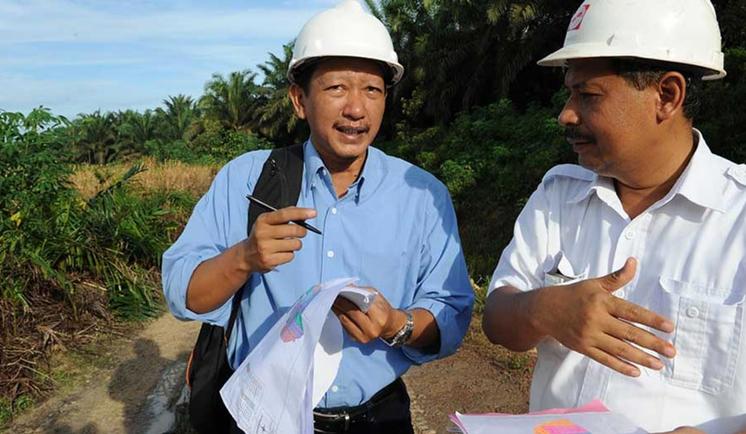
Giving workers a voice
In 2018, we partnered with our supplier, Sime Darby Plantation, to create a helpline for palm oil workers in Malaysia to report human and labor rights abuses. This third-party worker support line enables workers to safely report on working conditions, recruitment, safety and other rights abuses. Helpline coverage was extended in 2021 to cover all Sime Darby Plantations operations, or about 35 000 workers. More than 4500 workers have participated in in-person training, and many more have received informational posters, videos, and other forms of outreach. We also participate in the development of industry-wide grievance mechanisms. These include MY VOICE, an initiative by Social Accountability Initiative (SAI) which could enable workers to have more influence on the implementation of a social compliance system in the palm oil sector in Malaysia.
Responsible recruitment
Nestlé has supported several key initiatives to promote responsible recruitment, including funding the development of a human rights-based due diligence tool that supports palm oil producers in establishing transparency in their recruitment practices and identifying risks. A performance matrix allows suppliers to track and measure progress in their recruitment practices.
We have also invested in training assessors to identify forced labor risks associated with migrant workers’ recruitment, as well as supporting research (conducted by Earthworm) into recruitment practices and costs among small and medium-sized third-party suppliers.
Supporting children living on plantations
The presence of children on plantations is a risk in some parts of our palm oil supply chains. Thousands of children may live on palm oil plantations, often undocumented and without access to basic services such as education and schooling. Working with Earthworm, a Child Risk Assessment Framework has been developed to support palm grower companies. The Framework covers topics such as education, childcare, maternity protection, healthcare, nutrition, birth registration and child sexual exploitation prevention. A training model on the use of the Framework has also been developed and rolled out.
Wilmar Child Protection Policy
We continue to support a program developed by our supplier Wilmar to protect children living on plantations, in collaboration with Business for Social Responsibility. It included holding a series of stakeholder consultation workshops on Implementing Wilmar’s Child Protection Policy (pdf, 3Mb) for Indonesian plantation companies, government representatives, trade unions and industry associations. Following the workshops, Wilmar published its Child Protection Policy Implementation Manual which is being further refined for potential use outside of Wilmar’s supplier base.
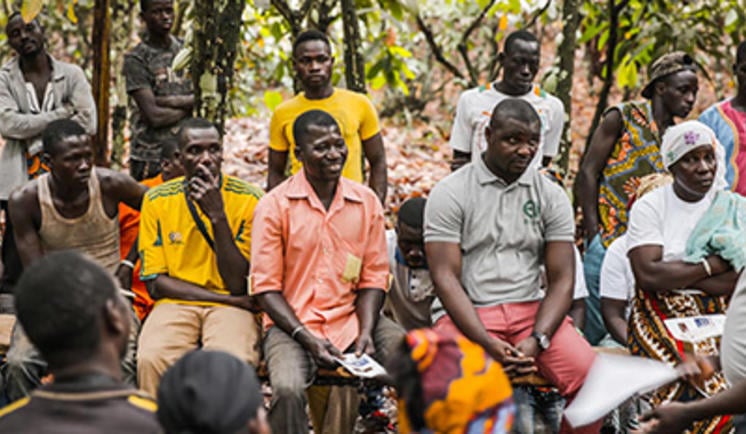
Multi-stakeholder engagements
While deforestation rates have decreased, the issue persists in some crucial ecosystems that are carbon sinks, and home to unique flora and fauna. To address these key challenges, we cannot work alone. We collaborate with local stakeholders and various industry partners to develop action plans, define milestones, and achieve lasting change.
In East Kalimantan, Indonesia, we support Earthworm in its multi-stakeholder engagements with the government and suppliers on two themes: children on plantations and fair employment for casual workers. These consultations included a workshop for 54 representatives from palm oil companies, the government, civil society organizations and labor unions.
Other partners and projects include:
We are working with industry bodies to increase awareness of the importance of sustainable practices and certification among producers to address a market shortage of palm oil produced to this standard.
As Board members of the CGF, we are actively involved in initiatives, including those which address challenges in the palm oil sector. We work with other members as part of the Palm Oil Working Group, addressing environmental and labor rights challenges at the industry level.
As a member of the POCG, we work with other brands, traders and producers to accelerate effective implementation of the No Deforestation, No Peat, No Exploitation (NDPE) commitments.
As part of POTC, we work collaboratively with other company members to assess the first importers of palm oil on their approaches to addressing deforestation and exploitation in order to promotetransparency and encourage progress beyond certification.
Nestlé and Verité developed the Program Assurance Framework to take into account macro, labor and operational risks in the supply chain. The framework is based on key labor data from refineries and their direct and indirect supply bases. It looks at suppliers’ systems and whether they are set up to address endemic and longstanding labor issues.



